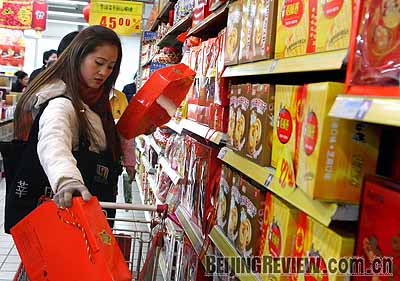| Numbers of the Week
$696 billion
By the end of 2008, China had held $696 billion U.S. treasury bonds, ranking the largest holder.
24.5%
The sales revenue of 1,000 key retail enterprises monitored by the Ministry of Commerce posted a year-on-year increase of 24.5 percent in January.

TO THE POINT: China wants to increase its trade with certain EU countries, because it believes the United States is becoming more protectionist with the recent "Buy American" provision in the U.S. economic stimulus package. China has defied similar trade risks in the past through overseas acquisitions and by purchasing products made in other countries. Chinalco plans to inject $19.5 billion into debt-ridden Rio Tinto, and China Minmetals is trying to takeover an Australian zinc producer. At home, the Chinese Government is trying to revive the country's 10 most important industries through its own efforts in the wake of plunging foreign investment.
By LIU YUNYUN
Revitalizing the Electronics and IT Industry
The government selected the electronics and information technology industry as the sixth of 10 industries it wants to revamp, following plans to overhaul the country's auto, steel, textile, equipment manufacturing and shipbuilding industries.
The latest readjustment plan was passed at a February 18 State Council meeting chaired by Premier Wen Jiabao.
The meeting recognized the electronics and information technology industry as one of the country's strategic pillar industries and emphasized three major tasks to develop them over the next three years.
The first task is optimizing the electronics and information technology industry's structure, upgrading its competitiveness and advancing the development of audio-visual digitalization. The second is encouraging independent innovation and grasping the technological know-how of integrated circuits. The third is fostering new sources of growth in the field of telecommunications equipment, new displays, digital TV promotions and 3G mobile communications.
Wen pledged full support for the industry and raised five proposals to achieve the goal. First, domestic consumption is expected to be the major driver of the industry. Second, social and personal investment funds are encouraged to be invested in the electronics and information technology industry. Third, competent companies are expected to conduct mergers and acquisitions and create independent inventions. Fourth, service outsourcing is encouraged, and companies should feel free to set up research and development centers, production bases and sales networks in overseas markets. Last, the industry should enjoy full policy support whenever needed.
"Buy European"
While the international community is bombarding the United States for its "Buy American" protectionist provisions, the Chinese Government has paved the way for its companies to purchase certain products in bulk from the EU.
At a Ministry of Commerce (MOFCOM) press conference on February 16, spokesman Yao Jian said China would soon send out purchasing delegations to four EU countries-Switzerland, Germany, Spain, and Great Britain. At the top of its purchasing list are engineering equipment and technology as well as other goods and services produced by the four countries. The EU is China's biggest trade partner and its most important source of technology imports.
Yao said importing more European environmental protection technologies could help China to upgrade its industrial structure and in the meantime lift the EU out of economic limbo.
The delegations were to depart in late February as part of China's commitment to help keep the global economy from collapsing.
Meanwhile, the global financial contagion has prompted some countries to adopt what other nations see as protectionist measures. Rising concerns of protectionism, stemming from U.S. President Barack Obama's "Buy American" provision in the country's economic stimulus package, are haunting global trade.
China has responded to the economic downturn in a different way by pumping money into the global market in exchange for goods it needs. Protectionism will ultimately hurt the interest of all nations, said Mei Xinyu, associate researcher at the Chinese Academy of International Trade and Economic Cooperation under MOFCOM.
Fiscal Revenue Slumps
The current economic downturn took its toll on China's fiscal revenue, which plunged to 613 billion yuan ($90 billion) in January, a 17-percent decrease year on year.
| 